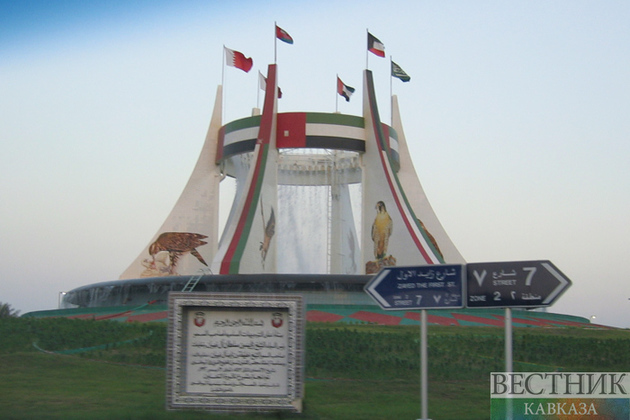China’s eagerness to also invest in technology, renewable energy, and infrastructure is driving the next phase of cooperation.
Over the years, Gulf Cooperation Council (GCC) countries have been at the forefront of Beijing’s foreign policy priorities as China plans to bolster its energy security, accelerate its economic growth, and deepen economic ties with Gulf nations through infrastructure building and telecommunications development, both of which are critical domains for China’s ambitious Belt and Road Initiative (BRI).
As The Diplomat writes, by investing strategically in critical sectors in GCC countries, China has become one of the top economic partners of several Gulf states. In the near future, Beijing hopes to extend its existing presence with the region’s countries, particularly after the narrowing of U.S. influence in the region. Thanks to Beijing’s economy-centric approach, the trade volume between China and Gulf countries has ballooned over the years. Beijing has become the region’s biggest investor and the GCC countries’ leading trading partner, with numbers reaching $330 billion in 2021. Beijing replaced Washington as the Middle East’s largest trading partner in 2010.
Core of trade relations
China’s huge energy demand is naturally at the core of the trade relationship with Middle Eastern countries. The Middle East is the largest oil supplier of oil and gas to China. In particular, the region accounts for nearly half of China’s oil imports, making it vital to Beijing’s energy security. In 2020, Beijing imported $176 billion worth of crude oil from the region, making China the world’s largest crude oil importer. This amount accounts for close to half (47 percent) of the region’s official imports, most of which are from Saudi Arabia. On the other hand, China has a distinctive feature that makes it stand out from other energy-hungry partners. Unlike the polarizing attitude of the United States in the region, Beijing has been able to establish smooth diplomatic ties with many Middle Eastern countries by focusing on win-win understanding and a non-interventionist attitude.
Investment
China’s diplomatic and economic ties with the Gulf countries have also created new opportunities for the oil-based economies of the region. The vast majority of GCC countries are overly dependent on oil revenues but have ambitions of weaning their economies off fossil fuels. By partnering with Beijing, GCC countries can diversify their economy and attract foreign direct investments. Hence, the Arab countries desire to expand cooperation with China on technology transfer, infrastructure development, and renewable energy.
Against this backdrop, existing Chinese investment in the region is expected to grow even further. Although Chinese investment in the Middle East has declined over the past few years, total investment in MENA (Middle East and North Africa) countries reached $213.9 billion between 2005 and 2021. Saudi Arabia is the largest recipient of Chinese investments among the MENA countries, receiving $43.47 billion between 2005 and 2021. The growth of Chinese investment in the Middle East varies substantially in terms of economic diversification. For example, in the last 15 years, China’s investments in Saudi Arabia have been distributed broadly into technology, renewable and nuclear energy, finance, logistics, arms production, and communication. Such economic diversification gives Chinese leaders more leverage to boost ties with the Middle East.
Sino-Arab summit
The economic ties between China and Gulf countries are expected to move into a new phase following the first Sino-Arab summit, which was held on December 9, 2022, in Riyadh. During the summit, bilateral relations were brought to a higher level in both the political and economic spheres. The summit focused on capacity building and collective action. Energy security, nuclear and new energy were the top issues of the meeting. The summit also underlined the food crisis and climate change.
However, the summit has fueled a lot of suspicion in the media as some pundits in the West have accused Beijing of trying to usurp the United States’ influence in the Middle East. China’s Foreign Ministry denied the allegation, stating in its recently released “Report on Sino-Arab Cooperation in a New Era” that Beijing has no desire to challenge Washington’s hegemony in the Middle East. Instead, the report emphasized joint development and a win-win partnership for China and GCC countries.
The paper also highlighted the details of China’s cooperation with the Middle East over the next decade in key areas such as agriculture, investment, finance, and high-tech industries. Whether Beijing has ulterior motives in the Middle East or not, the new process that will begin after the Sino-Arab summit will transform the relationship between Beijing and Gulf nations, taking their economic ties to a new higher level.
Disloging US
In sum, recent developments between China and Gulf countries have shown that Beijing is highly determined to forge comprehensive strategic partnerships with the Arab world and expand economic relations with regional powers in the Middle East. Of course, China still has a long way to go to dislodge Washington’s unrivaled influence in the region. However, the recent disagreement between Saudi leaders and U.S. President Joe Biden over OPEC+’s decision to cut oil production has further pushed the GCC countries to seek closer relations with China to counter Washington’s hegemony in the region. The summit in Saudi Arabia has the potential to create a win-win arraignment for both Beijing and Gulf states, such that all partners secure their interests while counterbalancing the overreaching powers of rival states.
Vestnik Kavkaza earlier reported that in recent years, the foreign policy of two Gulf states — Saudi Arabia and UAE – has been witness to significant changes. One of the important changes has been the strengthening of economic and security ties of both these countries with China. Simultaniously, the year 2022 was significant in its political and economic upheavals for the Middle East's energy sector. Oil and gas continued to play a major role in the region’s economic and political power. At the same time, countries continued moving toward renewable energy.






